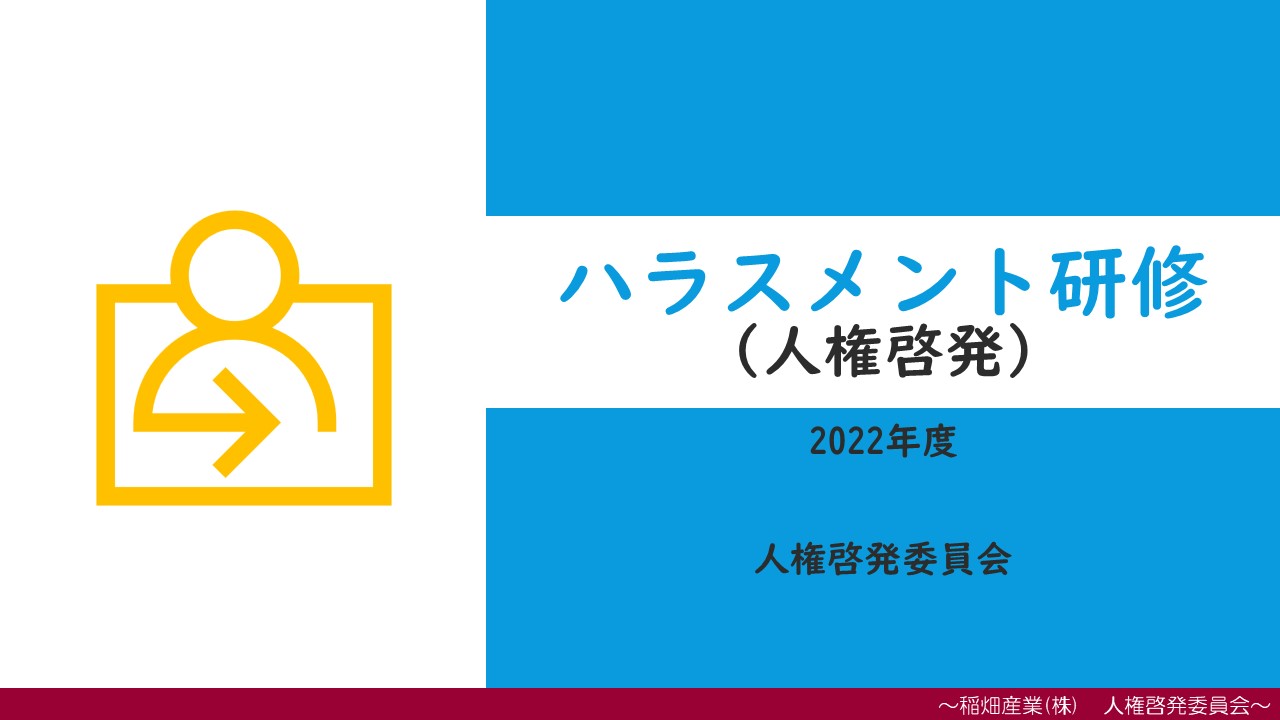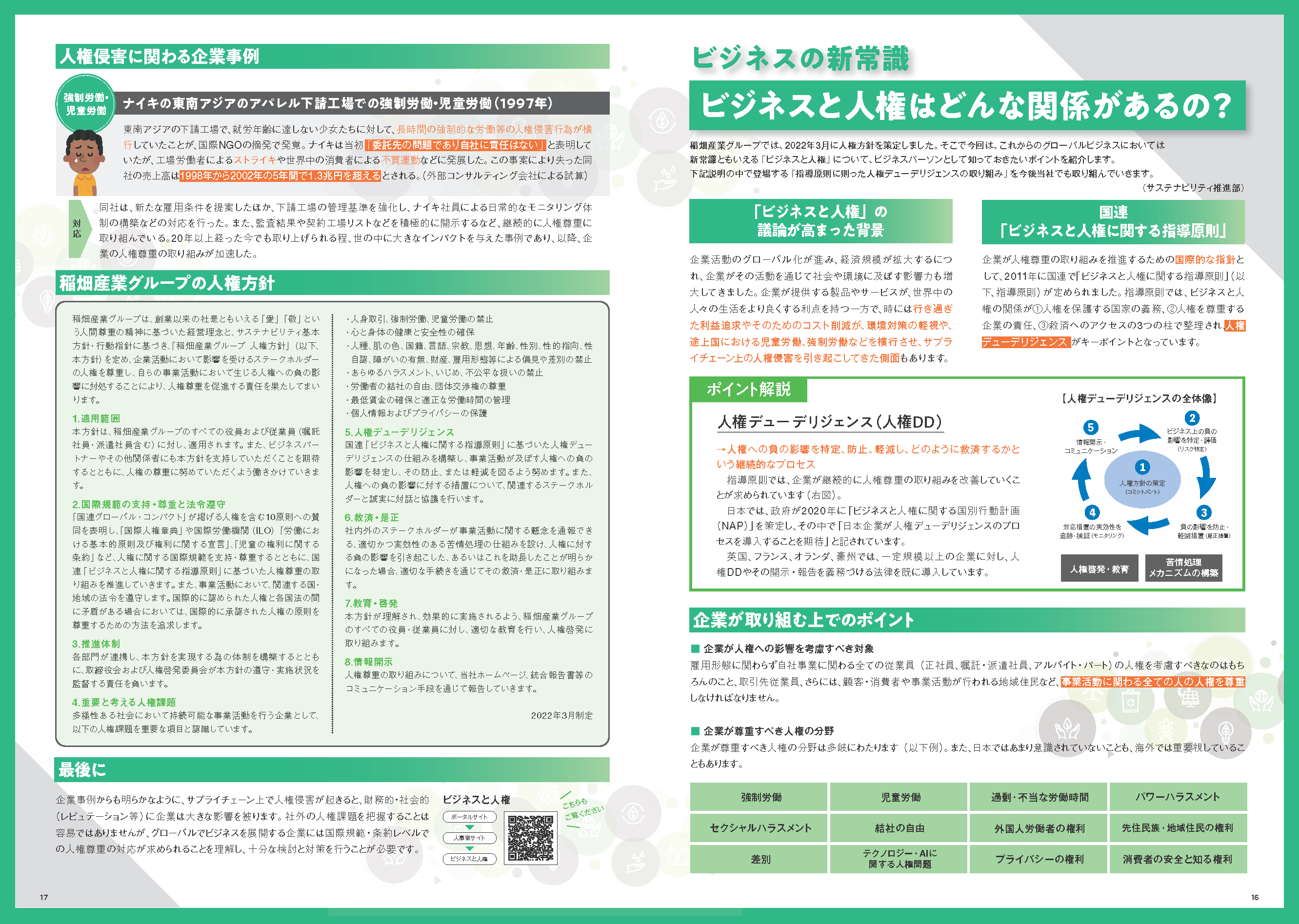- Policies and Basic Concepts
- Systems
- Human Rights Due Diligence
- Consultation Services
- Human Rights Training
- Collaboration with External Parties
Policies and Basic Concepts
In keeping with the spirit of love (ai) and respect (kei) advocated by its founder, the Inabata Group has always engaged in management based on respect for people. In recent years, respect for human rights in business has increased in importance worldwide. To fulfil our responsibilities as a company with a strong global network, we have formulated the Inabata Group Human Rights Policy to advance the spirit of respect for people.
Inabata Group Human Rights Policy
The Inabata Group’s management philosophy reflects our founding spirit of love (ai) and respect (kei) for all people, and the Inabata Group Human Rights Policy was formulated based on our Sustainability Basic Policy and Sustainability Code of Conduct. We fulfill our responsibility to promote human rights in our business activities by respecting the human rights of stakeholders affected by our activities and by addressing the negative impacts on human rights caused by our business activities.
1. Policy scope
The Human Rights Policy applies to all Inabata Group officers and employees, including contractors and temporary employees. We also encourage our business partners and all stakeholders to respect human rights and expect them to act in accordance with the policy.
2. Accepting and respecting international norms and legal compliance
Inabata has declared its support of the Ten Principles of the United Nations Global Compact, which includes human rights. We accept and respect international norms on human rights, including the International Bill of Human Rights, International Labor Organization (ILO) Declaration on Fundamental Principles and Rights at Work, and the United Nations Convention on the Rights of the Child. We also implement measures aligned to the United Nations Guiding Principles on Business and Human Rights. We also comply with the laws and regulations of the countries and regions where we conduct our business activities. If a national law conflicts with international principles on human rights, we will seek ways to honor the principles of internationally recognized human rights.
3. Policy application
All departments work together to build a system for following the policy, with the Board of Directors and Human Rights Affairs Committee responsible for overseeing implementation of the policy.
4. Significant human rights issues
As a company conducting sustainable business activities in a diverse society, we recognize the following human rights issues as significant to our business.
- Prohibition of human trafficking, forced labor, and child labor
- Ensuring mental and physical health and safety
- Prohibition of prejudice and discrimination based on race, skin color, nationality, language, religion, thought, age, sex, sexual orientation, gender identity, with or without disabilities, wealth, form of employment, etc.
- Prohibition of all types of harassment, bullying, and unfair treatment
- Freedom of association of workers and respect for collective bargaining rights
- Ensuring minimum wages and managing appropriate working hours
- Protection of personal information and privacy
5. Human rights due diligence
Inabata will build a system for human rights due diligence based on the United Nations Guiding Principles on Business and Human Rights. We seek to identify and prevent or mitigate the negative impacts on human rights caused by our business activities. Inabata will engage in dialogues and consultations with our stakeholders to address adverse human rights impacts.
6. Remedy and corrective action
We maintain an appropriate and effective grievance mechanism for stakeholders inside and outside the company to report concerns related to our business activities. In the event that our activities have been found to have caused or contributed to the negative impacts on human rights, we will provide remedy and take corrective action through appropriate procedures.
7. Education and awareness
To ensure that the policy is fully understood and effectively implemented, we take steps to educate and raise the awareness of all Inabata Group officers and employees about human rights issues.
8. Information disclosure
Inabata reports on its activities related to respect for human rights through the corporate website, integrated reports, and other means of communication.
March 2022
Systems
As specified in the Inabata Group Human Rights Policy, all departments work together to build a system to put the policy into practice. The Board of Directors and the Human Rights Affairs Committee are responsible for overseeing the status of policy implementation and compliance.
Human Rights Due Diligence
The Inabata Group is building a human rights due diligence mechanism in accordance with the United Nations Guiding Principles on Business and Human Rights, out of respect for the human rights of the people who are affected by its business activities.
We are currently assessing risks to human rights in order to identify, analyze, and evaluate adverse impacts on human rights. When carrying out human rights risk assessments, we evaluate potential adverse impacts on human rights and identify human rights risks from the perspective of the Group’s business areas and characteristics, the region or country of operation, the value chain, and other factors. During FY2022, we plan to identify priority human rights risks to address.
Consultation Services
We have a counseling desk in place as the point of contact for employees with issues related to harassment, evaluations, human relations, and other problems in the workplace. We have also set up a compliance hotline as the point of contact for employees with issues involving transgressions of laws and regulations, all types of misconduct, severe violations of human rights, serious harassment, and so forth.
These two consultation services—namely, internal whistleblowing system—can be used by any Group executive and employee regardless of their employment status, including nonregular employees and temporary workers. Under the system, employees handling whistleblowing reports are obliged to keep the identity of the whistleblower confidential. It is also prohibited to seek to identify whistleblowers, or to put whistleblowers or anyone cooperating with an investigation at a disadvantage. These and other rules allow employees and other personnel to safely provide information without fear of being at a disadvantage. We seek to keep employees informed by posting information about the consultation services on the corporate intranet portal, and by including the information in training sessions.
We have set up a point of contact for the general public and our stakeholders on the Inabata corporate website. Their opinions and suggestions are utilized primarily to improve customer satisfaction, promote stakeholder understanding, and prevent risk.
Human Rights Training
Every year, we organize human rights awareness and harassment training at collective sessions for all employees (executives, regular and nonregular employees, and temporary workers). We have also created an e-learning program that imparts the knowledge and ways of thinking needed to prevent harassment in the workplace and teaches criteria to judge what constitutes harassment. There are videos for all employees and managers on the intranet portal that can be viewed at any time. This facilitates learning by repeatedly watching, understanding, practicing, and reviewing.
We also bring in external experts to conduct sexual harassment training for staff in managerial positions. The training is designed to prevent harassment within departments and provides appropriate guidance, such as approaches to ensure that there are no cases of sexual harassment in the workplace. The training also addresses the current situation where perceptions of what constitutes sexual harassment have changed with the times and the generation gap.

Information about business and human rights is published in Inaho, the internal newsletter issued in Japanese and English for employees worldwide. The information includes case studies to enable employees to learn about human rights issues that should be considered while doing business.

Collaboration with External Parties
Inabata participates in the following subcommittees related to human rights at the Global Compact Network Japan:
- Human rights due diligence subcommittee
- Human rights education subcommittee
- Supply chain subcommittee
By taking part in these subcommittees, we study best practices in due diligence and other matters to prevent human rights violation. What we learn is linked to our efforts to respect human rights.
Furthermore, we participate in the Corporate Federation for Dowa and Human Rights Issue, Osaka, as a corporate member, and in the Osaka City Corporate Human Rights Promotion Council as a member of the steering committee.
In 2022, we participated in the Business and Human Rights Academy organized by the United Nations Development Programme on October 24 and 25. The Academy provided human rights due diligence training for Japanese corporations, including lectures by Japanese and overseas experts in human rights and groupwork by the participating corporations. We will reflect this in the human rights due diligence initiatives at the Inabata Group going forward.
